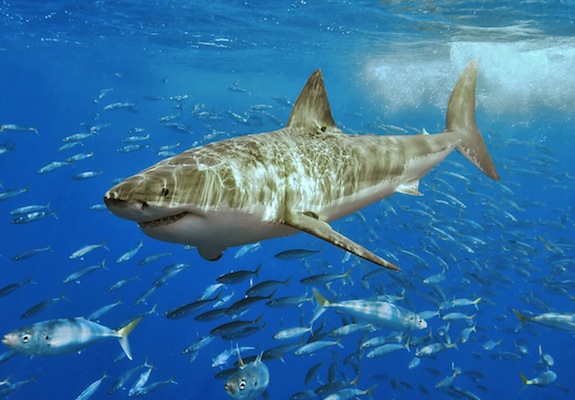Researchers Working on a “Chill Pill” for Sharks
In response to stress, sharks can undergo dangerous changes in blood chemistry, so scientists are attempting to develop a solution
![]()

In response to stress, sharks can undergo changes in blood chemistry that lead to sickness or even death. Photo via Wikimedia Commons/Terry Goss
Sharks are among the most fearsome creatures in the ocean. As you might’ve learned during Shark Week, they can grow to nearly 40 feet in length, have up to 3,000 teeth at any given time and are often the apex predators in their ecosystems, meaning that they can eat virtually any other animal in their environment and have no predators of their own.
There is, however, one exception—humans. Many species of sharks are highly endangered, and 32 percent of shark species are classified as threatened with extinction. Once considered “bycatch” (meaning they were inadvertently caught in the nets of fishermen seeking other species), they’re now increasingly targeted for their meat and fins.
They’re also threatened by a rather surprising problem: stress. “In recent years, there’s been a lot of research on sharks and stress,” says Lisa Naples, a veterinarian at the Shedd Aquarium in Chicago. “When introduced to a stressful event, they will have a variety of physiological responses to that stress, and we’ve found that some of these reactions are potentially life threatening.”
Which is why Naples and others including Disney’s Animal Programs are mounting an ongoing project to sample the blood of sharks both in the care of Shedd Aquarium and in the wild, with the hope of creating a better understanding of how stress makes them sick—and perhaps someday develop a medicine that prevents this dangerous response. The team’s first study, published last month in the Journal of the American Veterinary Association, draws upon samples they took from 66 sharks from different species in the wild, off the coast of the Florida Keys, and compares these to those of sharks in the care of Shedd Aquarium to establish a model for precisely what physiological changes occur.
A surprisingly wide range of events can trigger a dangerous stress-related reaction in a shark, Naples’ team has found. Environmental factors, such as heavy pollution, a change to the local habitat or even getting caught on a fishing line can induce the dangerous physiological changes that the researchers are studying.
These changes mainly relate to the animals’ blood chemistry. In the event of stress, lactic acid builds up in the blood, and if the blood escalates to a dangerously acidic level, permanent damage can occur, leading to sickness or perhaps even death. “As an analogy, it’s like what human runners experience when they get lactic acid build up in the muscles,” says Naples. “But with sharks, if they develop a severe enough level of lactic acid, they aren’t able to rebound from it. It can permanently effect all the cells in their body and become life-threatening.”
The research on this phenomenon is still in the early stages, but ongoing blood sampling is revealing some surprising nuances in the ways that it affects sharks in the wild. “We’re finding that individual species of sharks will respond differently to a stressful event, in both the degree to which they change physiologically, and their ability to recover from it,” Naples says. The researchers hope that their efforts will help them to understand just how much of a risk stress-related acid buildup is to wild sharks, and how much of a role it’s currently playing in threatening different species.
Eventually, they envision developing a proactive treatment for shark stress—a so-called “chill pill” for sharks. “If you know that they’re going to experience certain physiological changes, you work to find medical ways of assisting them,” says Naples. “There’s a potential for an oral substance—meaning either a pill or a liquid that goes down orally—or even an injectable medication that could help them counter the physiological changes.” Such a treatment might be deployed by fishing industries, so they could give it to sharks accidentally trapped as bycatch, increasing the odds of the sharks’ survival once they’re thrown back in the ocean.
It could also have broader applications for shark species put seriously at risk in the case of a catastrophe or environmental harm. “Our work will study the impact that issues such as climate change, oil spills and other environmental factors have on the overall health of sharks,” Naples says. Someday, in the rapidly warming waters of the Caribbean, instead of swimming away from sharks, we might be giving them medicine.
/https://tf-cmsv2-smithsonianmag-media.s3.amazonaws.com/accounts/headshot/joseph-stromberg-240.jpg)
/https://tf-cmsv2-smithsonianmag-media.s3.amazonaws.com/accounts/headshot/joseph-stromberg-240.jpg)